Donald Trump's neoconservative US National Security Advisor John Bolton admitted he “helped plan coups d’etat” in Venezuela and “other places,” in a CNN interview.
Multipolarista editor Benjamin Norton analyzes Bolton's book "The Room Where It Happened: A White House Memoir," which details the US hybrid war on Venezuela.
(Se puede leer esta nota en español aquí.)
Neoconservative former US National Security Advisor John Bolton admitted on network TV that he was involved in organizing coups d'etat.
Bolton is a hard-line right-wing hawk who was a leading architect of the Iraq War as a prominent diplomat in the George W. Bush administration. He has publicly called for the US military to bomb Iran and launch "pre-emptive" strikes on North Korea.
From 2018 to 2019, Bolton served as President Donald Trump's top national security official. In this role, Bolton oversaw a US-backed coup attempt against Venezuela's democratically elected socialist government.

In an interview with Bolton published on July 12, CNN anchor Jake Tapper accused Trump of attempting a coup inside the United States, and asked Bolton about a Congressional investigation into violent protests held by Trump supporters on January 6, 2021.
"One doesn't have to be brilliant to attempt a coup," Tapper said.
Bolton replied, "I disagree with that, as somebody who has helped plan coups d'etat - not here, but, you know, other places. It takes a lot of work."
Tapper later asked, "I do want to ask a follow up. When we were talking about what is capable, or what you need to do to be able to plan a coup, and you cited your expertise having planned coups."
"I'm not going to get into the specifics, but uh...", Bolton answered.
"Successful coups?" Tapper asked.
"Well, I wrote about Venezuela in the book. And it turned out not to be successful - not that we had all that much to do with it," Bolton said.
"But I saw what it took for an opposition to try and overturn an illegally elected president, and they failed," he added, implicitly admitting that Venezuelan President Nicolás Maduro was elected.
"The notion that Donald Trump was half as competent as the Venezuelan opposition is laughable," Bolton quipped.
"I feel like there's other stuff you're not telling me, though," Tapper responded.
"I'm sure there is," Bolton said with a laugh.
US government launched coup plot in Venezuela, targeting its oil
In January 2019, the Donald Trump administration launched a coup attempt in Venezuela by appointing little-known right-wing opposition politician Juan Guaidó as supposed "interim president" of the country, despite the fact that he has never received a single vote in a presidential election.
In an interview on Fox Business that same week, John Bolton admitted that the US government and North American corporations aimed to exploit Venezuela's oil reserves, which are the largest on Earth.

“We’re looking at the oil assets,” the US national security advisor stated bluntly. “That’s the single most important income stream to the government of Venezuela. We’re looking at what to do to that.”
“We’re in conversation with major American companies now,” Bolton revealed. “I think we’re trying to get to the same end result here.”
He added, “It will make a big difference to the United States economically if we could have American oil companies really invest in and produce the oil capabilities in Venezuela.”
John Bolton called for military coup in Venezuela
Mere days after declaring that unelected coup leader Guaidó was supposed "interim president," John Bolton threatened to send thousands of US troops to Colombia, hinting at an attack on Venezuela.
Bolton then publicly demanded that Venezuela's elected President Nicolás Maduro step down.
In February 2019, Bolton called for the Venezuelan military to launch a coup against President Maduro.
"To the Venezuelan military high command, now is the time to stand on the side of the Venezuelan people," he tweeted.


Threatening Venezuela in March, Bolton invoked the nearly 200-year colonialist Monroe Doctrine to justify US intervention in Latin America.
"In this administration, we're not afraid to use the word Monroe Doctrine. This [Venezuela] is a country in our hemisphere," he said in another interview with CNN's Jake Tapper.
Trump administration frequently discussed military attacks on Venezuela
Trump’s Secretary of Defense Mark Esper, a former vice president for weapons corporation Raytheon, revealed in a memoir he published in 2022 that the US government had frequently discussed military attacks on Venezuela.
"Trump had been fixated on Venezuela since the early days of his administration, with an eye toward using military force to oust Maduro," Esper wrote in the book, "A Sacred Oath: Memoirs of a Secretary of Defense During Extraordinary Times."
"Again and again, Trump would ask for military options," and his National Security Council "team was even more enthusiastic about them," he recalled.
Esper disclosed that he, Guaidó, and fellow coup-plotters had discussed plans for the United States to train fighters in Colombia to later launch an attack on neighboring Venezuela.
This is exactly what happened in May 2020, when the US government sponsored an attempted invasion of Venezuela, known as Operation Gideon.
The former US Army special forces comando who oversaw this plot, Jordan Goudreau, said he was given the green light for the botched invasion after meeting with US government officials at a Miami golf resort owned by Trump.


Bolton details Venezuela coup attempt in book
Trump fired John Bolton in September 2019, partially due to his failure in the Venezuela coup attempts.
In 2020, Bolton published a 500-page tell-all memoir, titled "The Room Where It Happened." He was offered a $2 million advance for the book, and promised millions more in royalties.
The memoir turned Bolton into a media celebrity. He cashed in on the opportunity to criticize Trump for supposedly not being enough of a warmonger.
"The Room Where It Happened" mentions Venezuela and Venezuelans more than 300 times, and has a 35-page chapter dedicated specifically to detailing his coup attempt, titled "Venezuela Libre" (Free Venezuela).
Bolton did not hide his neocolonialist worldview in the book, once again invoking the nearly 200-year-old Monroe Doctrine.
Fearmongering about Venezuela's alliance with China, Russia, Iran, and Cuba, he declared, "America had opposed external threats in the Western Hemisphere since the Monroe Doctrine, and it was time to resurrect it."
Bolton wrote that Trump shared this colonialist mentality. He claimed the president said that Venezuela is "really part of the United States," and that "it would be 'cool' to invade Venezuela," according to White House Chief of Staff John F. Kelly.
"Trump still wanted a military option," Bolton emphasized. This is consistent with what former Defense Secretary Mark Esper described in his book.
The neoconservative national security advisor also boasted in the book that the Trump administration's coup attempt against Venezuela had bipartisan backing from both Republicans and Democrats "on the Hill, where support on both sides of the aisle for our hard line in Venezuela was almost uniform."
"And the press coverage was uniformly favorable," he added contently.
Bolton pointed out the coincidental timing that, "Shortly after I became National Security Advisor, while Maduro was speaking at a military awards ceremony on August 4, he was attacked by two drones."
Maduro said his government has intelligence proving that Bolton had planned the assassination attempt.
Showing his sadistic streak, Bolton wrote that the photos of Venezuela soldiers running away from the killer drones was "hilarious."
In a meeting after the drone assassination attempt, Bolton wrote that "Trump said to me emphatically, 'Get it done,' meaning get rid of the Maduro regime. 'This is the fifth time I’ve asked for it,' he continued."
The national security advisor noted that Trump's secretary of state, former CIA Director Mike Pompeo, was strongly in agreement, stating "'we should go to the wall' to get Maduro out."
Bolton added, "Trump insisted he wanted military options for Venezuela and then keep it because 'it’s really part of the United States.'"
Trump had made it clear that he was considering invading Venezuela as far back as August 2017, Bolton pointed out. In a press conference that August, Trump had stated, "We have many options for Venezuela, including a possible military option, if necessary."
In the memoir, Bolton admitted that that illegal unilateral sanctions the United States imposed on Venezuela were aimed at "driving the state-owned oil monopoly's production as low as possible," in an attempt "to crash Maduro’s regime."
"Trump stressed that he wanted the 'strongest possible sanctions' against Venezuela," Bolton wrote.
Trump also "wanted assurances regarding post-Maduro access to Venezuela's oil resources, trying to ensure that China and Russia would not continue to benefit from their deals," he added.
Bolton stressed that Trump had great "interest in Venezuela’s oil fields," and he recalled that the US president insisted "we should take the oil in Venezuela after ousting Maduro."
Similarly, Bolton recalled numerous stories that showed how Trump's Treasury Secretary Steven Mnuchin, a former Goldman Sachs banker and hedge fund manager, was most concerned about the interests of US corporations.
He wrote that Mnuchin frequently "talked to oil-company executives." Mnuchin was concerned about remaining "US oil-and-gas assets in Venezuela," and "worried that steps in the banking sector would hurt Visa and Mastercard."
Bolton also revealed he pressured the UK government to illegally freeze more than $1 billion of gold reserves that Venezuela held in the Bank of England.
He celebrated sanctions as instruments of US financial warfare, declaring that "they're about using America’s massive economic power to advance our national interests. They are most effective when applied massively, swiftly, and decisively, and enforced with all the power available."
Boasting of the sadistic sanctions he imposed on Venezuela, Bolton gleefully wrote, "we had Maduro by the windpipe and needed to constrict it."
In an incredibly hypocritical moment of his book, Bolton accused the Venezuelan government, without any evidence, of supposedly trafficking drugs. But he simultaneously fondly recalled a meeting he had "in my office with Honduran President Juan Hernandez, who was similarly optimistic, in contrast to the situation in Nicaragua, on his border."
Honduras' right-wing authoritarian leader Juan Orlando Hernández (JOH) came to power after a US-backed military coup in 2009. JOH was a key US ally, and joined Washington in recognizing Guaidó. JOH was also a notorious drug dealer.
In 2022, JOH was extradited to the United States, and the Justice Department said "Hernandez allegedly partnered with some of the largest cocaine traffickers in the world to transport tons of cocaine."
Bolton concluded the chapter lamenting that the various US-sponsored coup attempts in Venezuela failed.
He also complained that Trump was not supportive enough. While Trump had pushed for extremely aggressive policies against Venezuela, he apparently did not much have faith in Guaidó, calling him "weak" and allegedly joking that he was the "Beto O'Rourke of Venezuela."


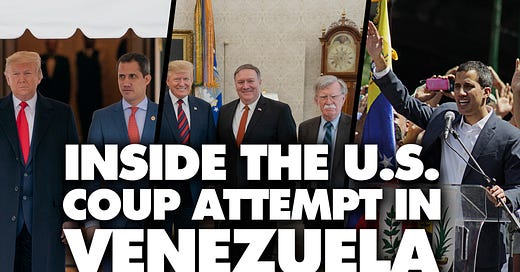
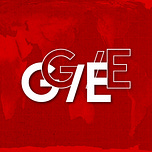


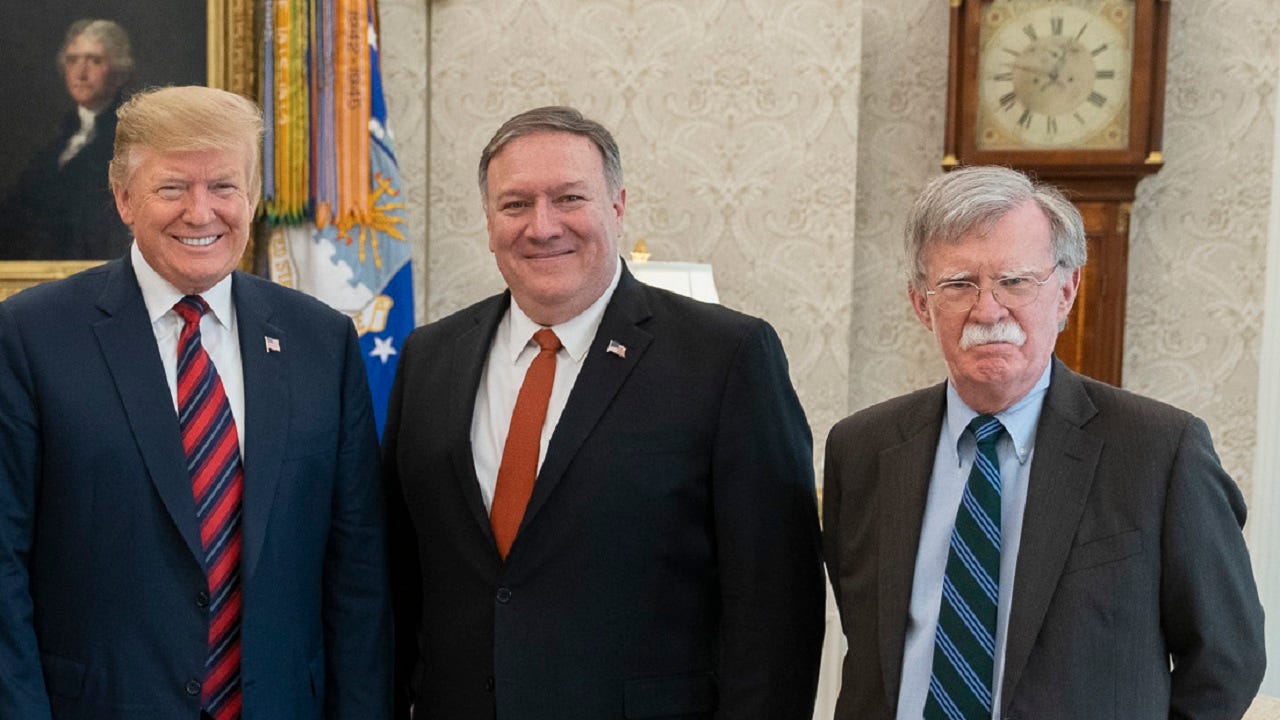
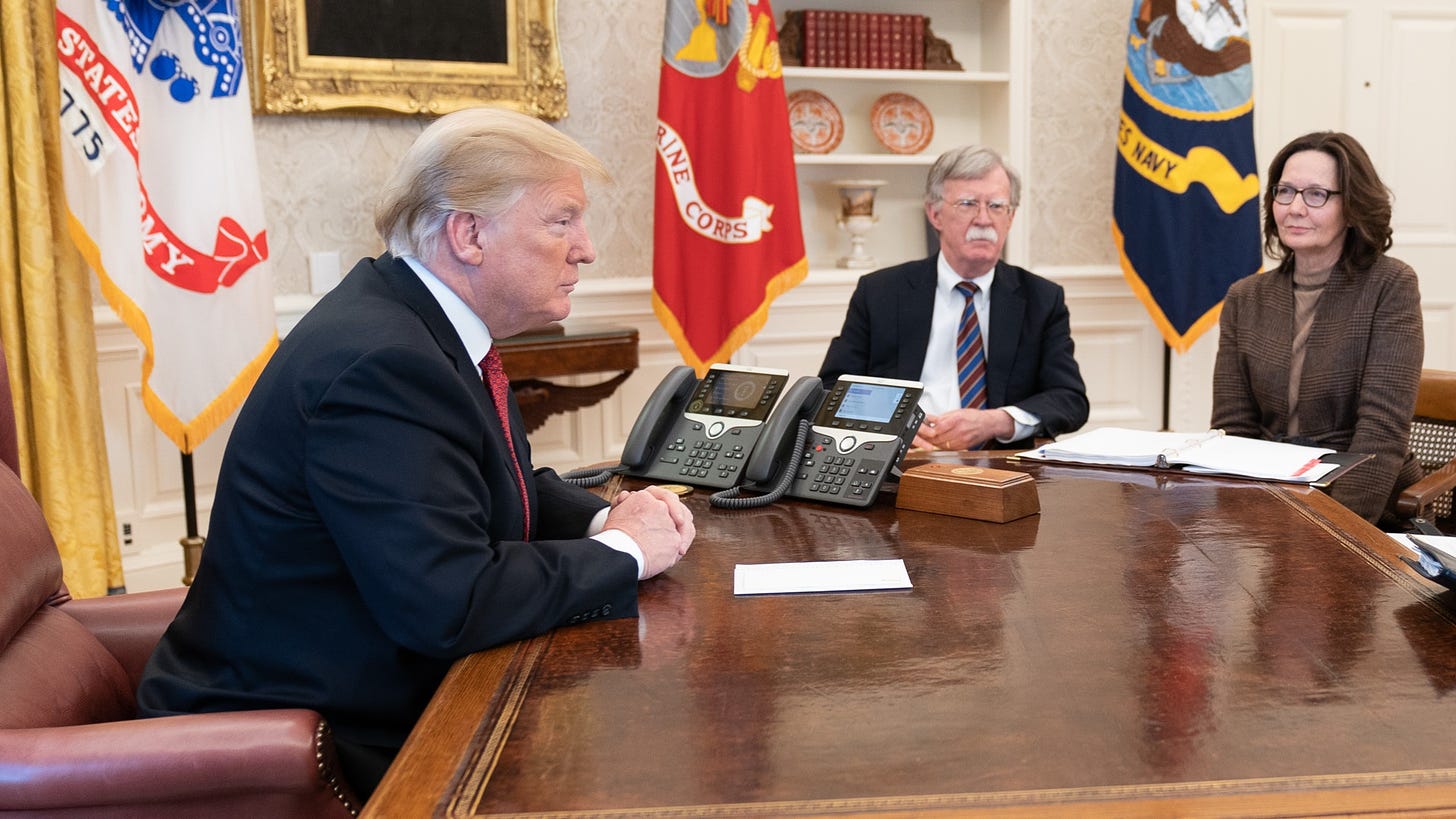




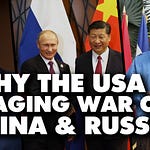




Share this post